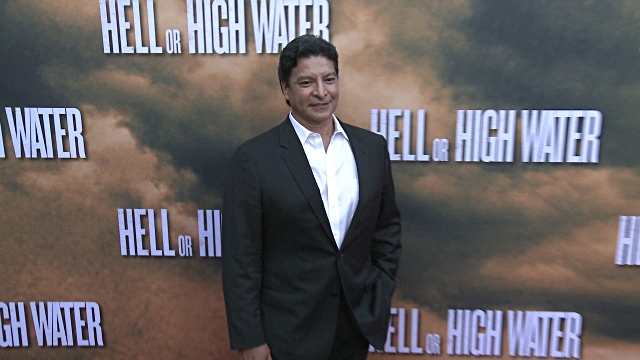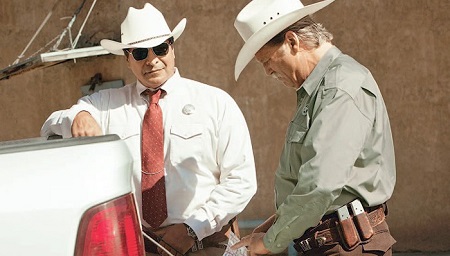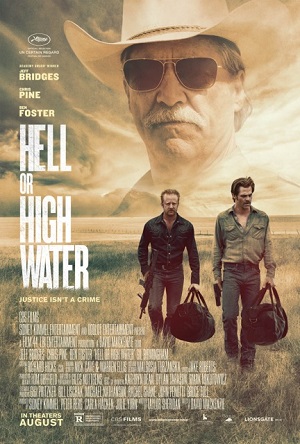
“Hell or High Water” – Interview with Gil Birmingham
by Sara Michelle Fetters - August 19th, 2016 - Interviews
Guided By Spirits
Veteran Character Actor Gil Birmingham Makes a Lasting Impression in Hell or High Water
Even if you don’t know the name, it’s highly likely you know the face, veteran character actor Gil Birmingham appearing in over 50 television shows and motion pictures during his long and varied 30-year career. Some of the highlights include memorable stints on programs like “Veronica Mars,” “House of Cards” and “Banshee,” miniseries like Into the West and films like Twilight, Love Ranch and The Lone Ranger. He’s an actor’s actor, the kind of sturdy, comforting presence that can make even the most horrendous of scripts come alive like they never would have otherwise, watching him work as pure a joy as any a film or TV lover could ever hope to have.
Finally, someone has stood up and taken notice of Birmingham’s talent, Hell or High Water director David Mackenzie tasking him to assume the mantle of Texas Ranger Alberto Parker and to work alongside Jeff Bridges as his acerbic, uncouth partner, Marcus Hamilton. Charged with stopping a pair of bank robbing brothers (played to equal perfection by Chris Pine and Ben Foster), Parker and Hamilton poke and prod one another while racing down lonesome West Texas’ highways stalking their prey, the duo’s calm, if somewhat jovial, demeanor masking cool, calculating minds intent on seeing justice come to pass.
A little less than a week before the film’s theatrical release I was able to touch base with Birmingham in a brief phone call. Here are some of the highlights from that conversation:
Sara Michelle Fetters: I’m going to be slightly unprofessional here for a second if that’s okay. I loved this movie. It’s possible during one important moment during the climactic act I might have even yelped a little bit out loud. Frankly, this film blew me away. Congratulations.
Gil Birmingham: Thank you so much! You’re much too kind. Sometimes I think the stars just align on a project and you end up feeling so very glad, and so very lucky, to have been a part of it. This was definitely one of those times.
Sara Michelle Fetters: What did you think when you got your hands on Taylor Sheridan’s script? Did you know immediately this was a project you wanted to be a part of?
Gil Birmingham: I was a big fan of Taylor after Sicario, so when this came down the pike I was immediately excited. I was drawn, not only to the characters, but the multitude of genres that the script is covering. It’s a road movie. It’s a buddy movie. It’s a thriller. It’s a heist film. But, more than that, it’s the moral dilemma for the characters, there’s just such great opportunity to explore the humanity between all of these characters as it referenced a time that’s very topical. The way it looks at people who have not yet recovered from the 2008 recession, I think a lot of viewers will resonate with the notion of having a legacy they’d like to leave to their families and to their loved ones yet presently feeling like that forces beyond their control are keeping them from being able to do that.
Sara Michelle Fetters: As you were looking at this character, when you were putting him together, how much time did you spend with either Taylor or David finding his various nuances? How much time did you and Jeff spend working out how that dynamic between your two characters was going to function within the confines of this particular story?
Gil Birmingham: Alberto offered me an opportunity to play a Native American character, a Native character who is also an authority figure, but one in contemporary times. Usually I’m approached to appear in period pieces, so this excited me a lot.
I do think, one of the challenges was with all the gabbing that Alberto had to constantly listen to and how I was going to make peace with all of it to not make it appear like the character was allowing Marcus to steamroll over the top of him. He takes all of these stereotypical pokes and jabs at my character, so the important thing for me and for Alberto was to find the key to it all; to discover why he reacts how he does to his partner’s digs.
For me, the key was that Alberto and Marcus were another set of brothers, and Jeff came prepared with that exact same mindset. The chemistry kind of unfolded because Jeff and I had music in common. We’ve both been playing and performing since we were young men, boys, really, and I think that opened a door to really fast connection, the creative expression from music transferring over to the film quite naturally. We just had to find that little niche that connected the two men. Once we did that all the pieces started to fall into place rather quickly.
When we found that connection, it became rather joyful. With Alberto being Comanche, and basically indigenous, I was able to imbue that character with the values of the culture. He has a very sensitive sense where Marcus is coming from, having lost his wife two years prior to our story and now being forced to retire. At the same time, the script allowed for all these reflections, all these nuances, allowing people to see what it can feel like when you’re being disrespectful to somebody. One of the great things about Alberto is his ability to be compassionate about this, understanding where Marcus is coming from, that through his pain this might be the only way he can express his love and affection for his partner.
Sara Michelle Fetters: I think one of the great aspects of Taylor’s script is that, even though it never dwells on the minutia of police work, it is never in doubt that both Marcus and Alberto are very, very good at their respective jobs.
Gil Birmingham: We were very blessed to have a technical consultant on the film, H. Joaquin Jackson, who is a fairly iconic Texas Ranger who has written a couple of books about his experiences. Also, I come from a law enforcement background. My father was a policeman for 30 years, so I already had that exposure, which helped a lot.
But, the Texas Rangers, when you do your research, when you look at their history, it’s all just so fascinating. In the present day, it really is their job to protect the property and lives of those in the State. We, Jeff and I, took that to heart. It’s a really great dynamic and history to learn about and then attempt to realize on film. I loved doing it.
Sara Michelle Fetters: I like that you bring up your own family background because, and this is a little off topic, but considering your family history, considering that you went to USC and earned a degree in Policy, Planning and Development, how does all that fit together to where you end up becoming such a sought after character actor?
Gil Birmingham: That’s a good question. The destiny of the gods? Whimsical happenstance? Blind luck? Who knows?
Honestly, I’ve had many moments in my life where I felt guided by spirits. Doors opened up that spoke to the nature of my own soul. I pursued my education, spent so much time in engineering, but these were just things to make a living, none of it spoke to my soul. Music was the first creative expression that I first wanted to indulge in, and acting just ended up being another part of that. The door opened, I took the step through it and I’ve been blessed ever since.
Sara Michelle Fetters: Could you have ever fathomed, though, when you were back being a bit player as the character “Featured Warrior” in 1987’s House II: The Second Story that you would be here now? That you’d be working alongside Jeff Bridges and being directed by someone like David Mackenzie? That you’d have such a terrific arc on “House of Cards” or be a featured player on “Unbreakable Kimmy Schmidt”? Did you ever let yourself think this could have been possible?
Gil Birmingham: You’ve done your research. House II? You remember that one?
I do think my story, if there is a message to be had from it, it’s that following your passion and trusting in the kindness of strangers can pay off. I’ve been given opportunities that, as long as I was persistent, as long as I put in the work, as long as I was honest, this could be the culmination. It hasn’t been easy, true, but I’d not have traded a moment of it, either.
Sara Michelle Fetters: You’ve worked with some pretty strong directors in your career, how does David Mackenzie stack up to them?
Gil Birmingham: I’d put him right up there at the top of my list. He has such a great sensitivity to material, to actors, to other human beings, such an open heart, that I think he’s just a great example of a person who has a vision with what he wants to do with his life and I think it shows in the creative vision of his work. At the same time, he’d give us so much leeway to craft our characters. This was one of the first times I worked on a project without a script supervisor, and the reason for that was that David didn’t want any intermediating influences on any of the actors’ processes as we built our characters. He wanted to keep things as pure and as natural as possible, to keep the emotional continuity going which I certainly think shows up inside the finished film.
Sara Michelle Fetters: And when you watch the film, what is that like, watching this journey take place? Especially as it pertains to Alberto?
Gil Birmingham: I just think it is all so brilliantly set up and is just such an unexpected turn. At the same time, what happens really helps encapsulate the relationship between Marcus and Alberto. It’s something special. Sure it can be a little contentious along the way, but they’re always there to cover one another’s back, and it is during the climactic stretch where you really get the full impact of the complexity of their relationship.
I think people will be very surprised by the film, about the genre they think that they know. There is so much depth and layering to the story yet at the same time it is completely entertaining. It doesn’t hit you over the head, message-wise, but at the same time you’ll get a taste of a lot of provocative thoughts and ideas; how we view the world and ourselves in it, how we treat one another in it. It’s all there and more.
Sara Michelle Fetters: For you personally, where do you see yourself going from here? Do you continue to transition between television and film, between small projects like this one and massive studio tentpole productions like next summer’s Transformers: The Last Knight?
Gil Birmingham: My first consideration is the writing, is the script, because that’s where the good stories come from and the foundation is laid, and whether that is in television or feature film is fine with me. I would love to do the kind of work that we got to do in this film, if I’m being honest. I actually got to be a part of Taylor’s next film, Wind River, his directorial debut, so I’m excited for people to get the chance to see that one sometime next year.
But to be working regularly as an actor is a gift. I’m in a grateful place right now, and the projects that I am meant to be involved with will hopefully continue to present themselves.
– Interview reprinted courtesy of the SGN in Seattle






